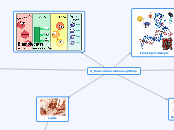por Lily Ji 6 anos atrás
204
Ji_MacromoleculeConceptMap
Biological macromolecules play crucial roles in living organisms. Lipids, composed of carbon, hydrogen, and oxygen, function in energy storage, cushioning organs, and insulating the body.

por Lily Ji 6 anos atrás
204

Mais informações
hormones, movement, immune system, transport
skin, hair, muscle, hormones
shapes allowed protein to do their jobs and a protein is denatured when it has lost its shape
Proteins have 4 layers
20 amino acids in living things - functional group and R group make them unique
store and transmit hereditary info
DNA/RNA
RNA has single chains and DNA has double chains
energy storage, cushion organs, insulates body
fats, oils, steroids, waxes
Phospholipidsare found in cell membranes
Saturated fats have single bonds and unsaturated fats have double bonds
quick energy, energy storage, structure
sugars, starches, cellulose, glycogen
carbon chains
Cellulose are found in cell walls and is known as fiber
Subtopic
Plants use starch and animals use glycogen